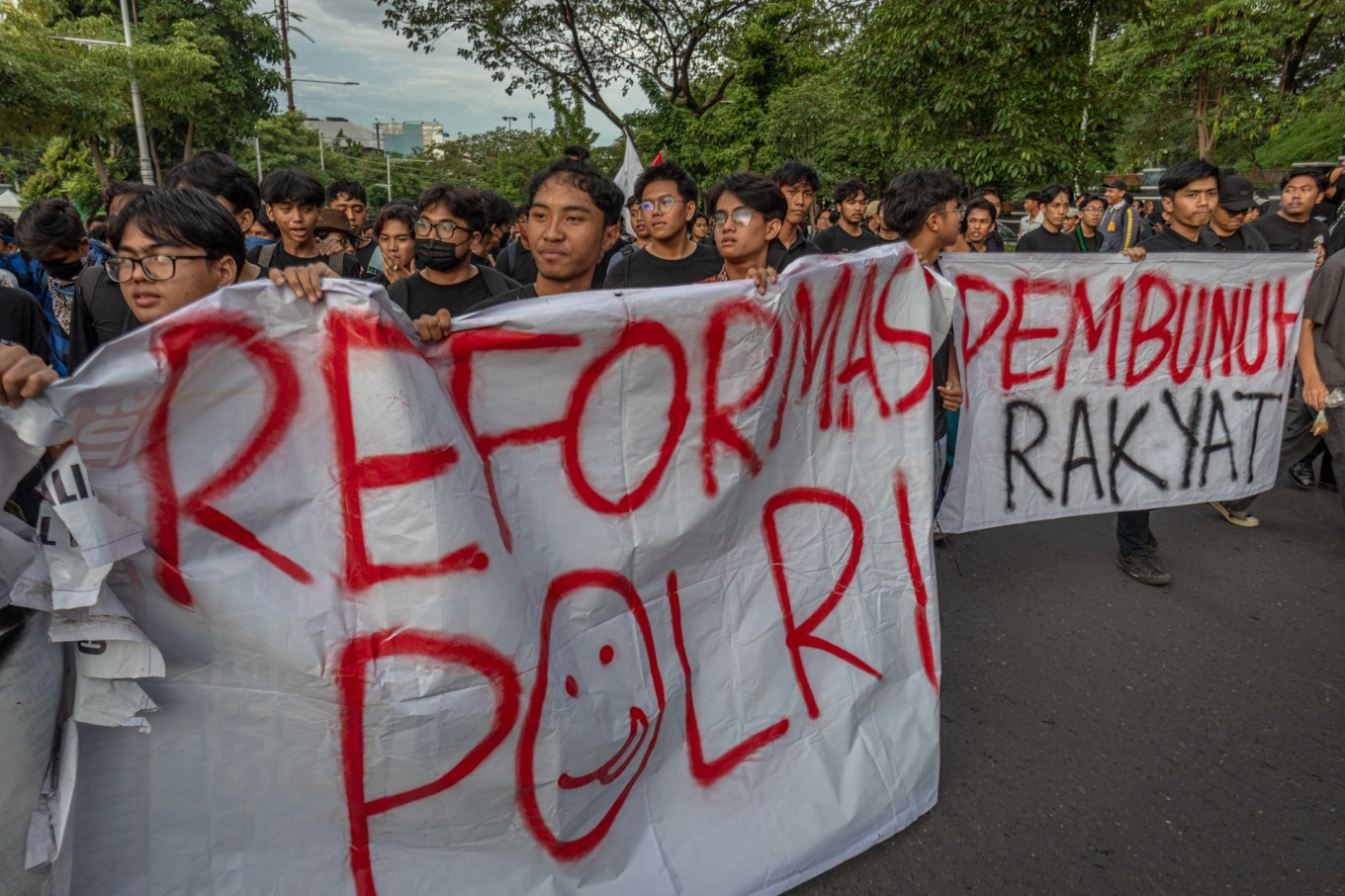News
Protesters now have a common “reform agenda”
Tenggara Strategics September 17, 2025 Fed up: Civil society activists and university students hold a banner that reads “Police reform“ (left) and “People's killer“ during a protest on Nov. 28, 2024, in front of the Central Java Police station in Semarang. (Antara/Aji Styawan)
Fed up: Civil society activists and university students hold a banner that reads “Police reform“ (left) and “People's killer“ during a protest on Nov. 28, 2024, in front of the Central Java Police station in Semarang. (Antara/Aji Styawan)
This month, protests demanding political and economic change continue, although smaller and more orderly. A clearer picture of demands that the government can respond to has been compiled into the “17+8 People’s Demands”.
Military intervention in the protests may have been a factor in lowering the political temperature that boiled at the end of August, when many protests in Jakarta and other cities turned violent.
Some analysts attribute this relative calm to the absence of agents provocateurs encouraging crowds to turn violent, with a hidden political agenda.
The House of Representatives in Jakarta was momentarily occupied, legislative buildings in several cities were razed, and the homes of four House members and former finance minister Sri Mulyani Indrawati were looted by mobs.
President Prabowo Subianto said the protests bordered on treason and terrorism but did not elaborate or provide evidence.
A growing consensus has emerged among students, labor unions, women’s and other groups, who took to the streets last month to adopt the “17+8 People’s Demands”.
Even Prabowo, some cabinet members, and the House are responding to, and thus legitimizing, the demands.
The “17+8 People’s Demands” include 17 items that the government must implement by Sept. 5, and eight other items that must be implemented by Aug. 31, 2026.
The demands apportion specific tasks to the President, House, political parties, police, military and economic ministers.
The numbers symbolically denote Indonesia’s Independence Day on Aug. 17.
The “17+8 People’s Demands” were created by youth activists and social media influencers, who had been inspired by earlier protests and the demands of over 200 civil society groups posted on the website of the Indonesian Legal Aid Foundation (YLBHI).
Published on Sep. 1, the demands quickly went viral and have been adopted by most protesting groups.
Topping the list of demands is for President Prabowo to withdraw the military from civil security arrangements, a point reiterated in a later demand for the military to return to the barracks and a commitment not to engage in civilian affairs during democratic instability.
Other demands include the immediate freezing of lawmaker salary increases, ensuring a more transparent salary structure, investigating controversial House members, and removing those who lack public support from office.
The “17+8 People’s Demands” also call on the police to release all demonstrators detained during the protests, cease using force against protesters, and hold their commanders accountable for any violence committed by police personnel. Other demands include for economic ministers to ensure adequate salaries for all workers and to take steps to prevent mass layoffs.
The eight demands with an Aug. 31, 2026, deadline are; to reform the House and political parties; draft fairer tax reform; strengthen free speech and human rights protection; police reform; review economic policies and environmental regulations.
Prabowo said these were “reasonable demands” during a meeting with a small group of journalists. However, he emphasized that the legal framework allows the military to protect the people against various threats, including terrorism.
He chose his words carefully, knowing public sentiment at the time.
While most cabinet members were equally careful not to outrightly reject the “17+8 People’s Demands”, the new Finance Minister Purbaya Yudhi Sadewa, who replaced Sri Mulyani, dismissed them as coming from a “small group of people” after his inauguration on Monday. The next day, he apologized, retracted the statement, and said he would pay attention to the demands.
Most House leaders have also responded positively to the “17+8 People’s Demands”, though they too sought to buy time.
With the Sept. 5 deadline already passed, the protesting groups now have the choice of accepting the responses by the government and House. At the very least, they have a checklist to press their demands.
While the “17+8 People’s Demands” may have slowed down the protest movement, the hashtag #resetIndonesia is gaining popularity online and without specific demands for the government to respond to.
What we've heard
A driving force behind the "17+8" People’s Demands movement is Andhyta 'Afu' Firselly Utami, founder of Think Policy. She expressed unease with the wide mix of demands raised during the week-long protests, which began on August 25. Afu emphasized the need to unify the narrative of these demands to facilitate a more straightforward response from the government.

